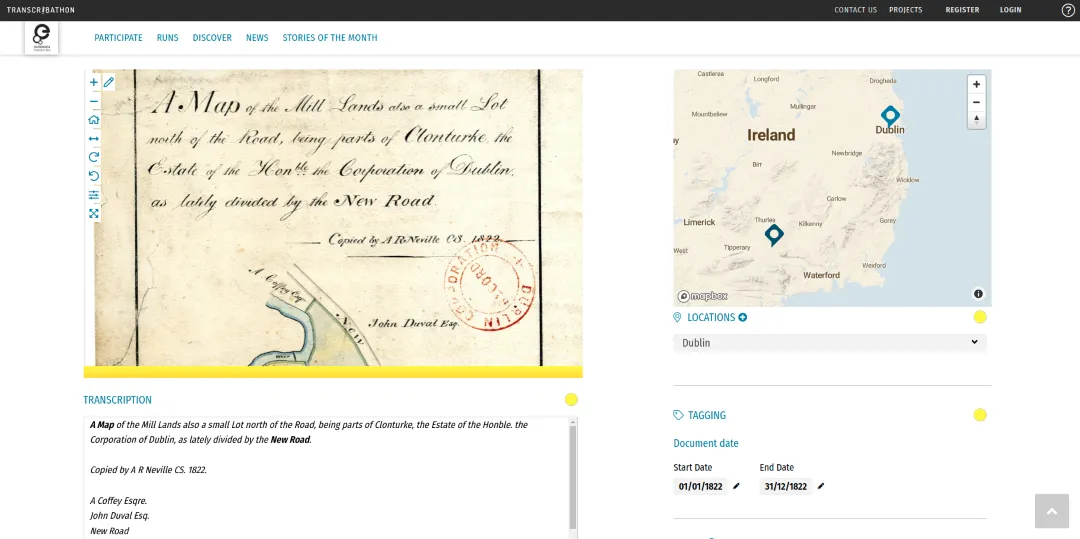In a new blog, Dr Kathryn Cassidy introduces us to the EnrichEuropeana+ project and the ongoing crowdsourced transcription work that is taking place as part of this project.
By Dr Kathryn Cassidy
Dublin City Libraries and the Digital Repository of Ireland (DRI) are part of a pan-European consortium selected for major European Commission funding for their project EnrichEuropeana+. This exciting initiative combines citizen science and artificial intelligence to transcribe handwritten documents from the 19th century and make them available to researchers, students, amateur historians, and the public.
Enrich Europeana+ and Transcription Week
From the 28th of March to the 1st of April, DRI participated in Transcription Week, which was run as part of the EnrichEuropeana+ project. Transcription Week was a crowdsourcing campaign to transcribe and enrich handwritten documents and maps covering almost two hundred years of Dublin’s history from 1695 to 1881, and the city’s transformation from a medieval city to the modern capital we know today. The campaign aimed to unlock these important historical documents and make them more easily available to historians, researchers, students and members of the public.
Transcription week focused on two important collections held by Dublin City Library & Archive, the Wide Streets Commission, and Dublin City Council Manuscript Minutes. These handwritten records have been available up to now in hard copy or in some cases as digital photographs. However the text has not been easily accessible, and because of that these important sources have not been as widely consulted as they could be.

Image: Screenshot of an object on the Transcribathon Platform
The Wide Streets Commission (1758 – 1851)
The Wide Streets Commission re-designed mediaeval Dublin (which was built along a west-east axis) replacing it with a city aligned along a north-south axis, with streets following mathematically-straight lines. The Wide Street Commission Collection includes minute books, architectural drawings, jury books, and over 800 manuscript maps. It details the city as it was, what it became, and includes details of what it could have been had different decisions been implemented.
Dublin City Council Manuscript Minutes (1840-1880)
The elected Dublin City Council (DCC) was established in 1840. Although the franchise was confined mainly to property owners, this was sufficient to enfranchise both Catholics and Protestants. Their numbers on DCC were very close, facilitating a power-sharing exercise, with a nationalist Lord Mayor one year, and a Unionist Lord Mayor the next. In 1841 Daniel O’Connell, ‘the Liberator’, became the first Catholic Lord Mayor in over 150 years.
The DCC held its meetings on the first Monday of each month. Notes were taken by the Town Clerk of Dublin and by his assistants, and these were worked up into minutes of meetings that were entered into large bound volumes which were then painstakingly indexed by the clerks.
Transcription Week was run under the aegis of the EnrichEuropeana+ project, which aims to unlock handwritten content from the 19th century. Using the Transcribathon platform, over 90 individuals, from Ireland and abroad, helped to transcribe maps and pages from the handwritten minute and Jury books, competing to become the top transcriber. Their work resulted in over 800 pages being partially or fully transcribed, coming in at an impressive 567,200 characters.
Although transcribers generally worked alone, there were also a number of online ‘Transcribe along with us’ events where users could ask questions and get help with any issues they encountered.
Transcription Week was a huge success, but the transcription effort isn’t done yet! The materials are still available on the Transcribathon platform and we are calling for more contributions. Dublin City Library and Archive (DCLA) is running a series of monthly webinars as part of the ‘Dublin Transcription Project’. If ‘Transcription Week’ was a sprint then the ‘Dublin Transcription Project’ will be more of a marathon where we hope to steadily work at transcribing important documents from Dublin’s past and making the contents more accessible to history fans, researchers and the general public at large.
The First ‘Dublin Transcription Project’ Webinar
For DCLA’s first webinar on Tuesday 24 May 2022 at 14:00 – 15:30 IST, Dr John Montague will speak to us about the Wide Streets Commission.
Dr John Montague is the associate professor of Architecture, in the College of Architecture, Art and Design, at the American University of Sharjah, in the United Arab Emirates. He has published on the urban history of Dublin, on John Rocque’s maps, and on Irish architectural history. He has worked as a consultant historian on numerous conservation projects in Ireland. He is doing important research on the works of the Wide Streets Commission, and is currently working on the draft of a book titled The Maps and Drawings of the Wide Streets Commissioners.
After Dr Montague’s talk and some Q&A, the organisers will chat about the ongoing Dublin Transcription Project and the work of transcribing and enriching these collections. The talk will be recorded and made available online afterwards, but the discussion of the transcription work will not be recorded.
You can register for the webinar on 24 May on Eventbrite.
Learn how to register for a Transcribathon account and start transcribing in your own time at the following link: https://europeana.transcribathon.eu/tutorial-english/
Enrich Europeana+ Project Info:
Transcription Week is part of the European Commission-funded EnrichEuropeana+ project.
The project partners are:
1. Austrian Institute of Technology – Austria
2. Stichting Europeana – The Netherlands
3. Facts & Files Historisches Forschungsinstitut Berlin Drauschke – Germany
4. Instytut Chemii Bioorganicznej Polskiej Akademii Nauk – Poland
5. Read-Coop SCE – Austria
6. The Provost, Fellows, Foundation Scholars and the other members of the Board of the College of the Holy and Undivided Trinity of Queen Elizabeth near Dublin – Ireland (Representing DRI)
7. Dublin City Council – Ireland
8. Uniwersytet Wrocławski – Poland
9. State Archives in Zagreb – Croatia




